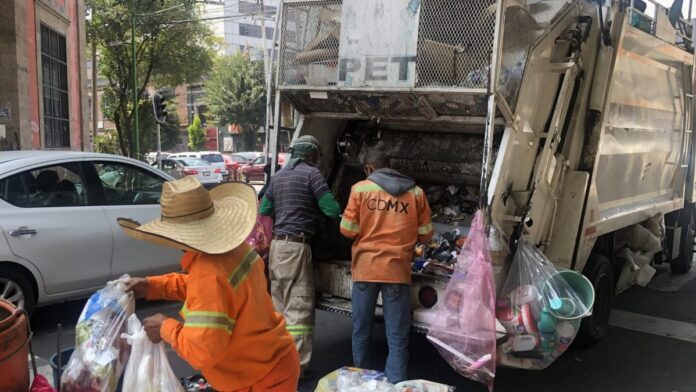In the Mexican capital, more than 10,000 people are dedicated to collecting solid waste and separating it for recycling. They survive with the tips that the population gives them for taking their garbage and with the sale of the waste, but they do not have a salary, contract, or recognition from the Government, which, nevertheless, benefits from their work. Volunteer collectors have supplied much of the official cleaning staff during the pandemic, but the authorities do not plan to formalize them.
In Mexico City, the public garbage collection service is an exclusive obligation of the Government: the Political Constitution and the laws mandate that only the official authority must sweep the streets and collect the 13,000 tons of garbage that the citizens of the capital generate every day. But the reality of the largest city in Latin America exceeds the regulations since the formally hired staff is insufficient for nine million inhabitants. This high demand is de facto remedied with an unofficial service, unsolicited but very well used by the municipalities and the central government: the volunteers.

It is an army of more than 10,000 people – in the most modest calculation – who sweep the streets, collect garbage from house to house, receive it and separate it in trucks and rescue recyclable waste in the process; all without a contract, without protection and without any pay.

The only income of these collectors is what they earn from the sale of waste to collection centers, in addition to the symbolic tips that citizens give them for this work: between 200 and 300 pesos (10 to 15 US dollars) per day.
“It is not that I have received a contract, that they give me Social Security, I have to do my own thing and the way to get ahead is with the help of people,” Francisco Bustamante, a volunteer street sweeper from Iztapalapa, told this team. the most populated municipality in the city and in the country. “Besides the sweep is like the view for people, who see clean and say ‘well, we’re going to give you the tip.’ Volunteering is hard but it is a job and well welcome, the thing is to work to get ahead, “he added.
The 34-year-old worker related how he earns the tip of the citizens, which is his only income: “Putting in and taking out garbage, running to the truck; I collect the waste from the houses because that’s where the tip comes from, that’s where I receive a payment, it’s not that the Government or any other entity supports me financially for the sweep. According to me, all street sweepers should be basic, receive a salary, and now yes: I demand that you sweep everything and leave it clean, “said the volunteer.
Although article 10 of the Solid Waste Law obliges municipal governments to have enough workers to carry out the public service of Limpia, during 2019 the City had a formal sweeper for every 1,183 inhabitants, according to figures from the local Ministry of Environment. Environment. Likewise, there was a collection truck to receive the garbage of 3,469 inhabitants, without considering the ‘floating’ population that only works in the capital but lives in another entity.

In addition to filling gaps in unpaid official service, volunteers have also saved Mexico City from collapse during the Covid-19 pandemic, according to the City Workers Union. With an overwhelming majority of men in the Limpia service and at least half between the ages of 50 and 70, the cleaning staff as a whole constitutes a high-risk population – also due to the nature of their work. For this reason, the Government had to confine 50% of its official personnel for almost all of 2020.
“It is being covered with both parties: one is done by the grassroots who have the condition to operate and the rest by volunteers. Just over 50% of those who are basified are considered to be able to pass the pandemic in their homes, ”said Julio Miranda, member of the Board of the CDMX Government Workers’ Single Union.
For his part, the mayor of Azcapotzalco, Vidal Llerenas, confirmed that in his demarcation a large part of the Limpia staff was confined by the health emergency and it is the volunteers who are filling this gap. “We are magically working with 30% of the personnel in these types of areas because they are personnel who are effectively of advanced age. The activity continues and … who does it? Well, without a doubt, those who stayed and in part the volunteers, “said the official in an interview with this team.
* This article is part of the series of publications resulting from the Journalistic Production Grant on Inclusive Recycling, executed with the support of the Gabo Foundation and Latitud R. You can find the full article and more content at www.distintaslatitudes.net
+ See the complete series here:
Source: france24.com






